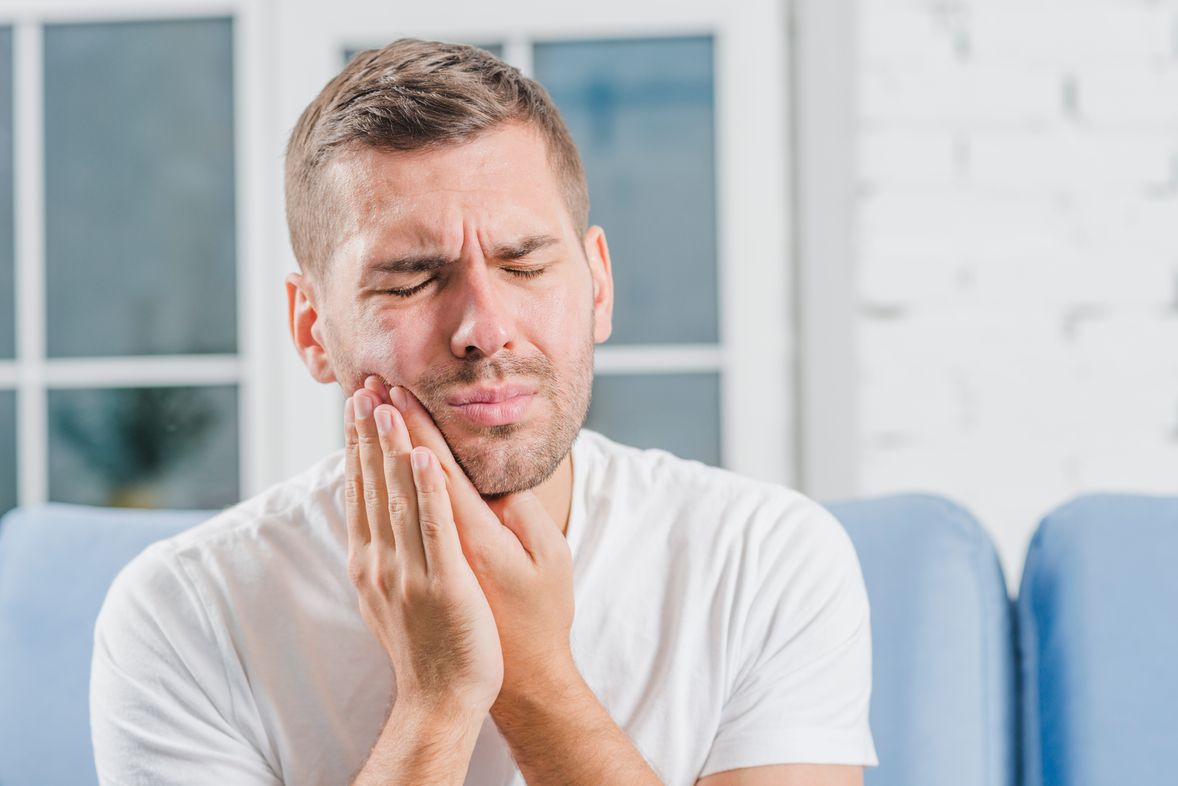

You might be wondering if you're the only one suffering or is it normal to experience teeth sensitivity? Sensitivity can be experienced while having anything that is hot, cold, sweet, or even when you breathe in from your mouth. Not all sensitivity problems need treatment. Sensitivity to some extent is experienced by everyone. But if it is severe then your dentist might help you with knowing what the cause is as well as provide you with treatment options.
According to the American Dental Association, 40 million adults in the United States are affected by teeth sensitivity. This condition is most common in adults between 25 and 40 years of age. It's a sharp pain that's caused by hot, cold, acidic or sweet foods and beverages.
Sensitivity can range from affecting a single tooth to affecting all your teeth. Severe sensitivity affecting all your teeth can be irritating and frustrating. Hence getting to the root cause of sensitivity is very essential.
Sensitivity is when the pain occurs only after the stimulus to cold and heat. Sensitivity pain lasts for a few seconds and goes off when the stimulus is removed. Tooth pain is a more severe type of pain that can range from dull pain to sharp shooting pain. A person suffering from tooth pain can have sleepless nights, disturbed sleep, pain while chewing food, pain while drinking normal water, etc. The tooth pain lasts from a few minutes to even hours or days.

The uppermost layer of the tooth is called enamel. The enamel is like a helmet that protects the underlying structures of the teeth. Protecting this enamel is very important as once the enamel is lost it cannot regrow again. Below this enamel is the yellow dentin which when exposed to any stimulus sends pain signals through the nerves which reside in the dentinal tubules. There are so many reasons and factors responsible for sensitivity.
Find out your reason for tooth sensitivity:
Many people have a habit of grinding or clenching their teeth while concentrating or during their sleep. Due to this, there is friction between both the surface of the teeth that are in contact. The friction causes the wearing of the enamel layer of the tooth exposing the super sensitive dentin.
Brushing too aggressively causes friction between the bristles of the toothbrush and the surface of the teeth again causing the enamel layer to wear off. This abrasion of the teeth is seen as small pits and ditches on the tooth. Due to these ditches, the underlying dentin is exposed and sensitive to cold, heat, sweet or any stimulus.
Dental enamel is the thin outermost layer of your tooth that protects the underlying layers from damage and decay. Enamel loss can be caused by a number of factors including tooth decay, gum disease, aging and genetics. Your enamel can also be worn away by brushing too hard or using a toothbrush with hard bristles. Without this protective layer, the dentine underneath becomes exposed causing you to feel pain when you consume food and drinks at extreme temperatures or eat highly acidic foods.
Caries activity starts from the enamel layer progressing towards the inner layers of the tooth. Once it reaches the dentin layer of the tooth the tooth becomes sensitive.
The acidic content in the foods and beverages can harm your teeth. It can cause erosion of the enamel and can be one of the reasons for your sensitivity. Severe stomach acidity and GERD can also harm your teeth by causing erosion.
As you grow older the gums show some changes like becoming loose and shrinking. The gums recede down exposing the roots of the teeth. The roots of the teeth are very much sensitive to cold or heat.
The tartar buildup and plaque which gets accumulated between the gums and the tooth irritate the gum tissue. This causes the gums to leave their attachment with the tooth and recede down. once the gums recede down it paves way for more plaque to accumulate. This cycle goes on exposing the roots of the teeth causing your teeth to become more and more sensitive. Gum abscess and tooth abscess can also give you the interpretation of having tooth sensitivity.
A crack in the tooth while biting something very hard is one of the most common reasons for single tooth sensitivity. A crack in your tooth allows food particles and bacteria to seep into the inner part of your tooth. The nerve endings are suddenly exposed and pain signals are carried to the brain. A fractured tooth or a chipped tooth also becomes sensitive as the enamel that protects the tooth breaks off.
Some degree of tooth sensitivity is expected after tooth-colored fillings. This is because when we drill the tooth to remove caries and fill the tooth with completely new material some of the contents might leach out and irritate the nerves. This type of sensitivity after fillings lasts for 7-10 days.
Most people experience sensitivity in their teeth after cleaning and polishing. This is because the area near the gums is made free from all the tartar and plaque deposits that were previously forming a layer on the tooth. Because of the tartar deposits, the underlying tooth structure is prevented from getting exposed to cold or heat stimuli. But if we do not clean our teeth that is much worse.
Whitening your teeth is nothing but bleaching them to become more white and bright. Previously many whitening agents which were available in the market had been known to cause teeth sensitivity. One of the reasons for this being the bleaching agents in the whitening kits were known to irritate the dentin layer of the tooth. But with newer kits available the whitening kits in the market these days have proved to cause lesser or no sensitivity.
If you experience sensitivity only in one of the tooth your dentist might prescribe you a sensitivity gel (SenolinSF gel)to be applied to that particular tooth. If it subsides then there is no need to go for extensive treatment. However, if it does not resolve then your dentist might give you the option of placing a cap or a crown over it.
The primary line of treatment would be using milder toothpaste-like Senquel-F, Thermoseal toothpaste, Sensoform, etc. For severe sensitivity, one can use the Vantej toothpaste as prescribed by the dentist. The sensitivity toothpaste acts by leaching out the contents from the toothpaste and blocking the nerves in the dentin tubules that carry the pain signals.

Recent studies prove oil pulling with either edible pure coconut oil or sesame oil may help reduce tooth sensitivity. Oil pulling is a preventive measure to stop the plaque and tartar build-up on the teeth. It also prevents tooth cavities and gum infections.
Guava leaves, garlic saltwater rinses capsaicin gel, and turmeric are also known to reduce tooth sensitivity to some extent.
1) Make sure your toothpaste contains fluoride. Fluoride prevents tooth cavities by bonding with the enamel crystals and making your teeth stronger. Don't forget to floss your teeth.
2) Avoid drinking and eating acidic food and beverages.
3) Ask your dentist to make you a nightguard or mouthguard to protect your teeth from grinding against each other. If you're into any kind of sports activity and are more prone to accidental falls and injuries wear mouthguards to protect your teeth from fractures.
4) Don't brush your teeth very hard. Brush your teeth gently and slowly to avoid causing harm to your teeth as well as your gums.
5) Visit your dentist in case you accidentally bite anything hard or get your tooth chipped or fractured.
6) Avoid teeth whitening very often.
7) Visit your dentist every 6 months for cleaning and polishing even if you are not suffering from any kind of dental problem.
Dr. Amrita Jain is a practicing dental surgeon since 4 years. She completed her B.D.S in 2016 and was has been a rank holder throughout her course. She suggests “Holistic dentistry is the best dentistry”. Her treatment line follows a conservative pattern which means saving a tooth is of utmost priority and preventing your teeth from getting decayed rather than curing it with a root canal treatment. She inculcates the same while consulting her patients.Apart from her interest in clinical practice, she has developed interest in research and writing over a period of time. She states “It is my clinical experience that motivates me to write and spread dental awareness”.Her articles are well researched with a combination of technical knowledge and clinical experience.
scanO is an AI ecosystem transforming oral health for patients, dentists, corporates, and insurers worldwide

© 2025 Trismus Healthcare Technologies Pvt Ltd